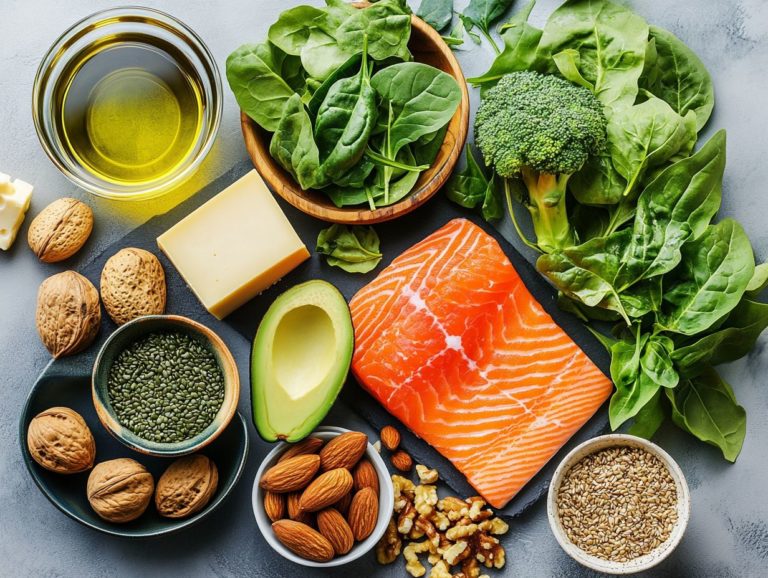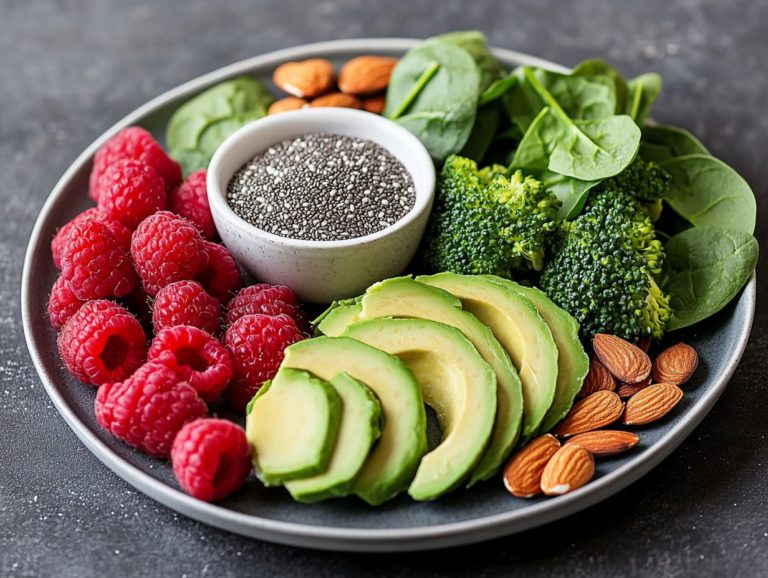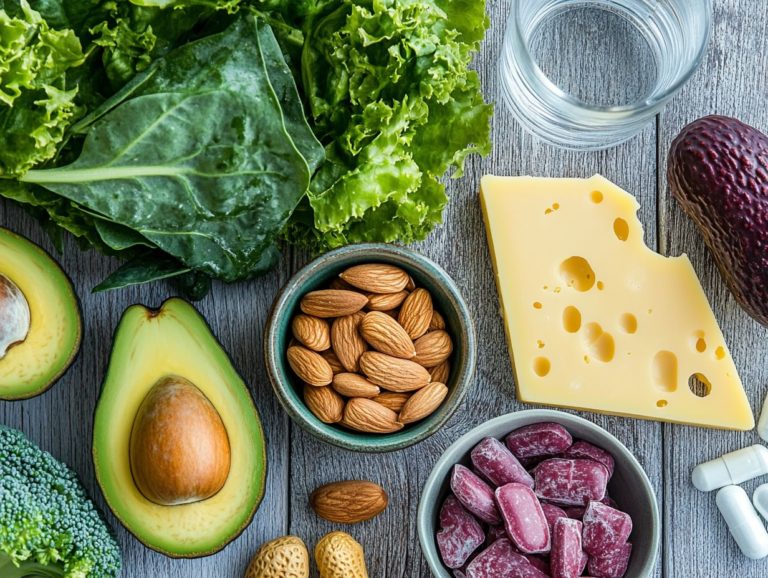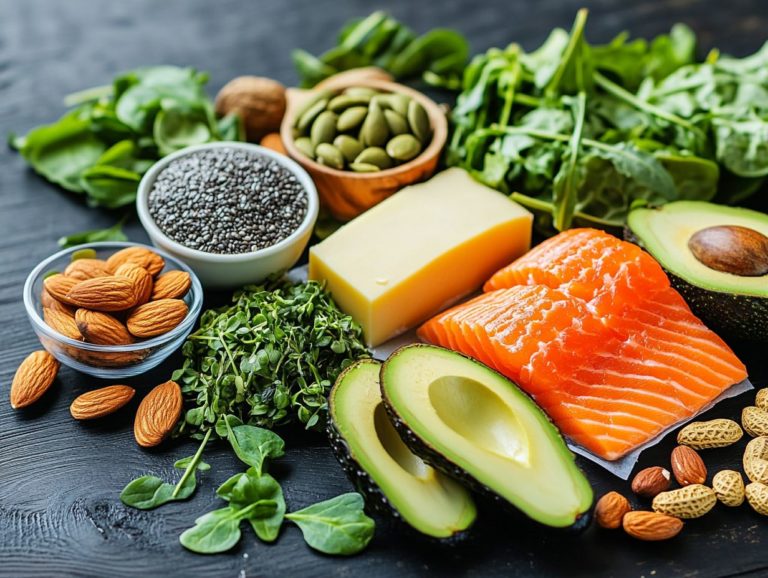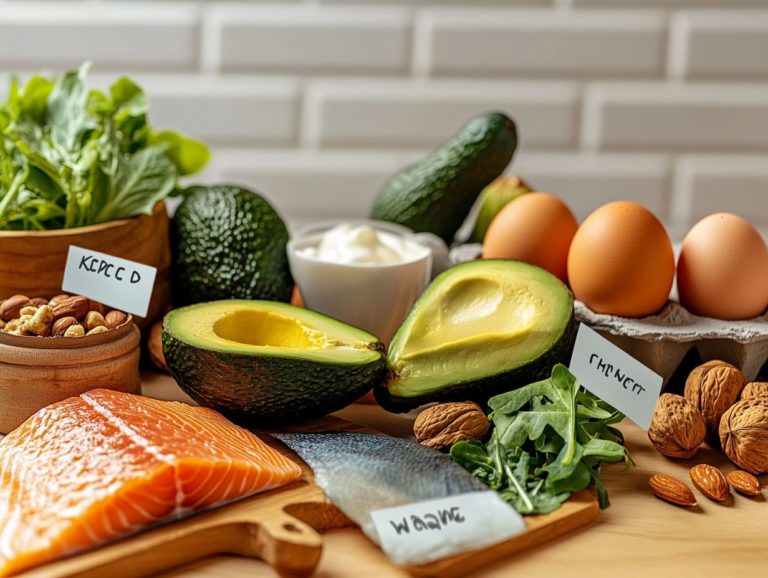How to Avoid Nutrient Deficiencies on Keto
The keto diet has surged in popularity due to its promising potential for weight loss, enhancement of overall health, and managing cholesterol levels.
However, like any dietary approach, it presents its own unique challenges, especially concerning nutrient intake and maintaining micronutrient levels.
Grasping these elements is vital for anyone aiming to truly thrive on a keto lifestyle.
Contents
- Key Takeaways:
- What Is the Keto Diet?
- What Are the Key Nutrients to Watch for on Keto?
- What Are the Common Nutrient Deficiencies on Keto?
- 5. Iron
- Frequently Asked Questions
- What is the keto diet and how does it affect nutrient intake?
- What are the most common nutrient deficiencies experienced on the keto diet?
- How can I avoid nutrient deficiencies while on the keto diet?
- What are some common signs of nutrient deficiencies on the keto diet?
- Why is it important to stay hydrated while on the keto diet?
- What should I do if I suspect I have a nutrient deficiency while on the keto diet?
Key Takeaways:

- Eat more nutrient-dense foods to ensure you get essential vitamins, minerals, and healthy fats.
- Consider electrolyte supplements to avoid deficiencies.
- Keep tabs on key nutrients like magnesium and potassium to stay healthy on keto.
What Is the Keto Diet?
The keto diet, more formally known as the ketogenic diet, is a carefully designed low-carbohydrate, high-fat eating plan aimed at fostering weight loss and enhancing overall health.
By guiding your body into a remarkable metabolic state called ketosis a state where the body utilizes stored fats for energy instead of carbohydrates this diet can lead to impressive reductions in body fat percentage, improvements in HDL cholesterol, and a notable boost in energy levels.
It s no wonder this dietary approach has surged in popularity recently; its potential health benefits and effectiveness in weight loss make it a compelling choice for many seeking a transformative lifestyle change.
What Are the Different Types of Keto Diets?
You ll find a variety of ketogenic diet variations designed to align with different dietary preferences and lifestyle needs. These include the standard keto diet, targeted keto diet, cyclical keto diet, and high-protein keto diet, each tailored to optimize fat consumption while keeping carbohydrate intake low.
Understanding these unique approaches is crucial if you re considering the keto lifestyle. Each variant brings its own set of advantages and potential drawbacks.
The standard keto diet is perfect for those seeking a comprehensive, sustained fat-burning strategy. The targeted version may suit athletes who need that extra energy boost for their workouts.
If you re looking to balance ketosis with higher carb days for muscle recovery, the cyclical keto diet could be an appealing option. The high-protein variant is ideal for anyone aiming for enhanced satiety and muscle preservation.
Recognizing your personal goals and nutritional needs is vital in choosing the right keto path. Dietary alternatives can significantly influence the crafting of a personalized plan that supports your overall health and manages health concerns.
What Are the Key Nutrients to Watch for on Keto?
On the ketogenic diet, you must watch specific key nutrients closely to prevent potential deficiencies and maintain your overall health. The substantial reduction in carbohydrate intake can disrupt the balance of micronutrients, particularly essential vitamins and minerals like magnesium, calcium, and potassium.
Regular monitoring of micronutrient levels and vitamin deficiencies is important. By focusing on nutrient-dense foods and understanding common deficiencies, you can confidently meet your nutritional needs while fully embracing the health benefits that come with a ketogenic lifestyle.
1. Electrolytes
Electrolytes especially sodium, potassium, and magnesium are absolutely essential for maintaining fluid balance and muscle function. If you are on the ketogenic diet, it is vital to keep an eye on these components to avoid health risks like dehydration, muscle cramps, and potential kidney health issues.
These minerals play key roles in nerve transmission, energy production, and overall cellular function. On a keto diet, your carbohydrate intake drops significantly, which can lead to a rapid depletion of these important electrolytes due to factors like increased urination and shifts in appetite.
You can easily replenish sodium through salt and broth, while potassium is readily available in leafy greens, avocados, and nuts. Don t forget magnesium, which you can find in seeds, dark chocolate, and fish.
If you overlook your electrolyte balance, you might face serious consequences like fatigue, headaches, or even severe issues like cardiac arrhythmia. Don t risk your health make sure you re getting enough electrolytes!
2. Fiber
Your fiber intake may dip while following a ketogenic diet due to carbohydrate restrictions, but it s vital for promoting healthy digestion, nutrient absorption, and overall wellness. This highlights the importance of thoughtfully choosing ketogenic foods that are rich in fiber to ensure adequate fiber intake.
As you prioritize a balanced and nutrient-rich diet, aim for a daily fiber intake of at least 25 grams. You can easily achieve this by incorporating a variety of high-fiber, low-carb foods into your meals, such as:
- leafy greens
- avocado
- chia seeds
- nuts
These fiber-rich options not only support digestive health but also play a crucial role in managing blood sugar levels and reducing cholesterol.
By carefully selecting these foods for your meal plans, you can reap the numerous health benefits of fiber while still adhering to your carbohydrate goals.
3. Vitamins and Minerals

Monitoring vitamin deficiencies is essential when you’re on the ketogenic diet, as it often limits several food groups that are key sources of vital vitamins and minerals. Pay special attention to nutrients like vitamin D, calcium, magnesium, vitamin B1, B6, B12, and iron, all of which are crucial for your overall health and how your body uses energy.
Understanding how these nutrients function is important because they play various roles in energy production, immune function, and maintaining bone health. For example, vitamin D is crucial for calcium absorption, while B vitamins are key players in converting food into energy. If you neglect to keep an eye on your nutrient intake, you might face serious health risks, including fatigue, weakened immunity, liver problems, and even neurological issues.
To combat potential deficiencies, it is wise to incorporate a diverse array of keto-friendly foods into your meals—think leafy greens, nuts, seeds, and fatty fish. If you find it challenging to meet your nutrient needs through food alone, dietary supplements could be a valuable addition to your routine, ensuring your health remains uncompromised. Additionally, learning how to balance nutrients on keto can further enhance your diet. Regular blood tests can also help in monitoring your nutritional needs and adjusting your diet accordingly.
How Can You Avoid Nutrient Deficiencies on Keto?
To avoid nutrient deficiencies on the ketogenic diet, you need a strategic approach to meal planning and diligent nutrient monitoring. This means incorporating a diverse range of nutrient-dense foods into your meals, considering dietary supplements when necessary, and ensuring a balanced intake of healthy fats. Regular nutrient monitoring through blood tests can also help in adjusting your dietary strategy to meet your long-term health goals.
By doing so, you can support your long-term health and optimize your energy production.
Start incorporating these nutrient-rich foods into your meals today for a healthier you!
1. Incorporate Nutrient-Dense Foods
Incorporating nutrient-dense foods into your ketogenic diet is essential for ensuring you receive the necessary vitamins, minerals, and fiber. This approach enhances nutrient absorption. It also promotes overall health while you navigate dietary restrictions and maintain dietary balance.
Consider adding leafy greens like spinach and kale to your meals; these greens are brimming with vital vitamins A, C, and K, along with essential minerals such as iron and calcium.
Avocados deserve a spot in your kitchen as well, thanks to their rich content of healthy fats and potassium. These are key for maintaining your electrolyte balance and potassium levels. Fatty fish, particularly salmon, is another fantastic choice; it offers omega-3 fatty acids that support heart health and help reduce inflammation.
Make sure to include nuts and seeds, like almonds and chia seeds; they re vital! They provide both fiber and protein, helping you feel full while keeping your carb counts in check.
These nutrient-dense options not only satisfy the dietary needs of those following a ketogenic lifestyle but also play a critical role in promoting your long-term health.
2. Consider Supplements
Considering dietary supplements while following a ketogenic diet can be an effective strategy for addressing potential vitamin deficiencies and ensuring that you meet all your nutritional needs. This is especially important for essential nutrients that might be challenging to acquire solely through food. Consulting with health professionals like Howard E. LeWine, MD, and using trusted services like Quest Health for blood tests can provide valuable insights.
For those of you embracing this low-carb lifestyle, it s vital to monitor your nutrient intake closely. The restriction of certain food groups can lead to deficiencies in important vitamins and minerals. Incorporating supplements like magnesium, potassium, and electrolytes can be crucial in supporting your overall health, particularly in maintaining optimal muscle function and hydration levels.
Regular blood tests to check magnesium levels, calcium intake, and other key nutrients can be beneficial. Omega-3 fatty acids can enhance heart health while offering anti-inflammatory benefits. It s wise to weave these supplements into your daily routine, particularly during the initial adaptation phase of the diet. This can help alleviate common side effects, like the keto flu (a group of symptoms some people experience when starting the diet), and promote your overall well-being.
3. Monitor Your Intake
Keep an eye on the big nutrients (like fats and proteins) and small nutrients (like vitamins and minerals) you consume. Monitoring your intake is crucial on the ketogenic diet to prevent nutrient deficiencies and the health risks that come with them. Regular assessments will ensure that you re meeting your dietary recommendations and maintaining optimal health.
By carefully tracking what you eat, you can gain valuable insight into your nutritional balance and pinpoint any potential gaps. Additionally, conducting routine blood tests to evaluate your vitamin and mineral levels provides critical insights into your personal dietary needs.
Understanding these factors allows you to make informed choices and gives you the power to address and mitigate any health issues stemming from imbalances in nutrient intake. Use apps that help you track your food intake easily; they offer features that analyze your dietary habits while considering your specific health goals.
This approach fosters an environment where balanced nutrition becomes not just achievable, but sustainable.
What Are the Common Nutrient Deficiencies on Keto?
On the ketogenic diet, you may encounter common nutrient deficiencies that arise from its restrictive nature. Magnesium, potassium, calcium, and iron are among the most frequently reported deficiencies, and these can significantly affect your health and well-being.
It’s essential to be aware of these potential gaps in your nutrition to maintain optimal health while following this dietary approach.
Discover why magnesium is a superstar for your health!
1. Magnesium

Magnesium is an essential mineral that you might find lacking if you’re following a ketogenic diet. This deficiency can lead to unwelcome health risks, such as muscle cramps and fatigue, due to magnesium’s involvement in over 300 biochemical reactions in your body.
This vital mineral is crucial for maintaining numerous bodily functions, including nerve function and blood sugar regulation. Without sufficient magnesium intake, you could be setting yourself up for increased health complications when embracing a low-carbohydrate lifestyle.
To boost your magnesium levels while sticking to your keto principles, consider incorporating magnesium-rich foods into your meals. Leafy greens, nuts, seeds, and avocados can significantly enhance your nutrition.
Effectively managing your magnesium levels is crucial as it supports your physical well-being. By recognizing deficiency signs, you can make proactive dietary choices that keep you feeling your best.
Next, let s explore the importance of potassium in your diet!
2. Potassium
Potassium is an essential electrolyte that often falls short on the ketogenic diet, presenting health risks such as high blood pressure and muscle weakness. This underscores the importance of careful checking of your potassium levels.
This vital mineral is important for maintaining fluid balance and regulating your heartbeat. When potassium levels dip, the risk of hypertension increases, and you may experience fatigue and cramping.
For anyone adhering to a keto diet, incorporating high-potassium foods is crucial right now. Consider avocados, spinach, and mushrooms as excellent choices; they align perfectly with your dietary goals while providing essential nutrients to help maintain your electrolyte balance.
By regularly monitoring your potassium intake, you can safeguard your overall wellness and alleviate the risks associated with deficiency.
Let s dive into the significance of vitamin D for your health!
3. Vitamin D
Vitamin D plays a vital role in maintaining bone health and supporting immune function. If you’re following a ketogenic diet, you might face vitamin D deficiencies due to limited sunlight exposure and a lower intake of fortified foods.
This nutrient is essential for calcium absorption and keeping your bones healthy, which is particularly important for preventing osteoporosis. Without adequate vitamin D, your immune response may suffer, making you more vulnerable to infections and chronic diseases.
To counter these risks, you should consider incorporating fatty fish like salmon and mackerel into your meals, as they are naturally rich in vitamin D. You can also use supplements to help boost your vitamin D levels. Strategizing safe sun exposure can enhance your body s ability to synthesize this crucial vitamin naturally.
Finally, let s look at the importance of calcium!
4. Calcium
Calcium stands as a cornerstone for bone health and muscle function. If you re following a ketogenic diet, you might face a deficiency often due to a reduced intake of dairy products, leading to long-term health risks, including osteoporosis.
This essential mineral is important for various bodily functions, such as blood clotting and nerve signaling. Without adequate calcium, you may experience muscle cramps and weakened bone integrity.
Consider incorporating these calcium-rich alternatives into your meals:
- Leafy greens like kale and spinach
- Fortified almond milk
- Chia seeds
By embracing these options, you can effectively meet your calcium needs while minimizing the risk of related health issues, all without sacrificing the benefits of a low-carb diet.
5. Iron
Iron plays a crucial role in transporting oxygen throughout your blood. However, many individuals on a ketogenic diet find themselves struggling with low iron levels. This deficiency can lead to fatigue and compromised immune function, underscoring the importance of incorporating iron-rich foods into your dietary routine.
The restrictive nature of the keto diet often limits access to many iron-rich foods, such as legumes and whole grains, putting you at risk for deficiency. Low vitamin B12 levels and insufficient animal protein intake can worsen iron deficiency.
To address these challenges, those following a keto lifestyle should prioritize incorporating iron-rich sources into their meals. Consider options such as:
- Red meat
- Poultry
- Seafood
- Leafy greens like spinach and kale
These choices align with keto principles and help you meet your nutritional needs while promoting overall health.
Frequently Asked Questions
What is the keto diet and how does it affect nutrient intake?

The keto diet is a high-fat, moderate-protein, and low-carbohydrate eating plan that puts your body in a metabolic state called ketosis. It can lead to nutrient deficiencies because it restricts certain food groups that are important sources of essential vitamins and minerals.
What are the most common nutrient deficiencies experienced on the keto diet?
The most common nutrient deficiencies on the keto diet include calcium, magnesium, potassium, and certain B vitamins such as thiamine, folate, and vitamin B6.
How can I avoid nutrient deficiencies while on the keto diet?
To avoid nutrient deficiencies on the keto diet, make sure to fill your plate with a colorful variety of nutrient-rich foods like leafy greens, non-starchy vegetables, nuts, seeds, and low-carb fruits. You can also consider taking supplements to ensure you are getting adequate amounts of essential nutrients.
What are some common signs of nutrient deficiencies on the keto diet?
Common signs of nutrient deficiencies on the keto diet include:
- Fatigue
- Weakness
- Muscle cramps
- Constipation
- Changes in mood or cognitive function
Why is it important to stay hydrated while on the keto diet?
Staying hydrated is crucial while on the keto diet. It helps prevent nutrient deficiencies. When the body is in ketosis, it excretes more water and electrolytes, making it vital to drink enough water and replenish electrolytes to maintain a proper nutrient balance.
What should I do if I suspect I have a nutrient deficiency while on the keto diet?
If you suspect you have a nutrient deficiency, don’t wait consult a healthcare professional today. They can help you identify any deficiencies and provide guidance on how to adjust your diet or supplement intake to address them.


